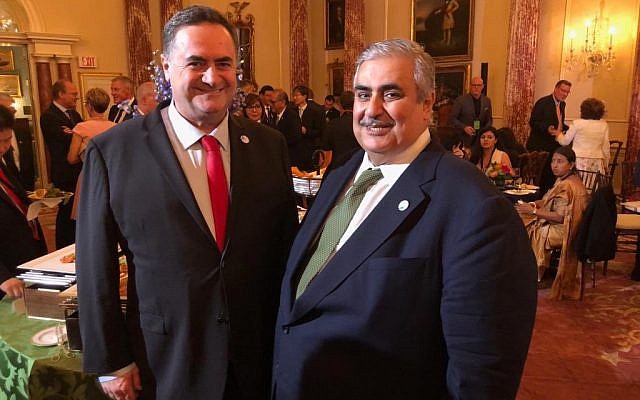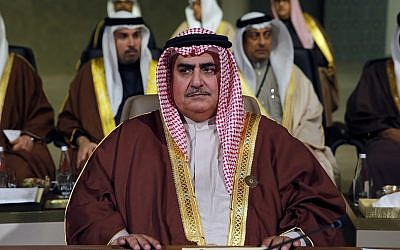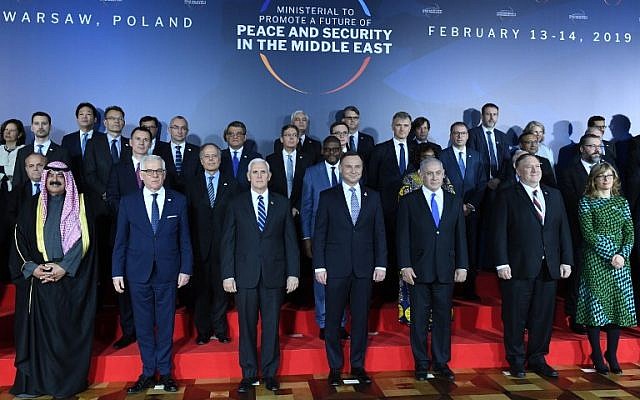
Israel Katz and Khalid bin Ahmed Al Khalifa pose for picture, discuss regional threats and bilateral ties; US envoy calls rare meeting ‘tremendous progress’
By RAPHAEL AHREN and ALEXANDER FULBRIGHT Today, 10:19 pm
Foreign Minister Israel Katz met his Bahraini counterpart for talks on Iran in Washington and the two posed for a rare photograph, marking what Jerusalem said was a boost in ties with the Gulf nation.
The photo of Katz and Khalid bin Ahmed Al Khalifa, which was posted on Twitter Thursday by US Middle East envoy Jason Greenblatt and later shared by Katz as well, was taken at a State Department event on religious freedom. It marked the rare instance in which a top Arab official is publicly documented meeting a senior Israeli figure.
Greenblatt described the encounter as a “friendly exchange” and hailed it as “tremendous progress.”
Katz said the public meeting with the Bahraini minister was “another example of our growing diplomatic connections.”
“I will continue to work with [Prime Minister Benjamin Netanyahu] to advance Israel’s relations with the Gulf countries,” he said.
Katz later put out a statement, saying the meeting was organized by State Department officials and that he and Khalifa “discussed Iran, regional threats and bilateral relations, and agreed to remain in contact.”
There was no immediate comment from Khalifa, but the details came as Bahrain announced it would hold a meeting on security, that will include Israeli participation, according to a diplomatic source.
Like most Arab states, Bahrain does not have diplomatic ties with Israel, though there has been an opening between the two in recent years amid their shared antipathy toward Iran.
Last month, Bahrain hosted an American-led conference where US President Donald Trump’s peace team rolled out the economic aspects of its long-awaited proposal to solve the Israeli-Palestinian conflict.
While no Israeli officials were there, a number of businessmen and journalists were invited to attend the workshop.

In an interview with The Times of Israel on the sidelines of the conference, Khalifa expressed the desire for better relations and eventually “peace” with Israel — a country he nonchalantly declared a part of the region and “there to stay.”
He said that he would like to visit Israel in the future — “one day, when it’s all open and peaceful” — but was noncommittal about normalizing ties with Jerusalem in the absence of a peace deal.
Khalifa, who is considered the most pro-Israel official in the Gulf, also reiterated his support for Israel’s right to defend itself, a comment he first made last year following an Israeli airstrike on Iranian targets in Syria.
Separately, Bahrain’s foreign ministry announced Thursday it will host a “maritime and air navigation security meeting” soon, but did specify a date.
The ministry said the meeting, which will also be led by the United States and Poland, was a follow-up to a February conference in Warsaw on the Middle East.
That conference was originally billed as part of efforts to counter Iran, but was later toned-down and instead focused on the vague goal of seeking stability in the Middle East.
“The Ministry of Foreign Affairs stresses that this meeting will provide an opportunity for consultation and exchange of visions among many countries in the world, to find ways to deter the Iranian threat and ensure freedom of navigation in this strategic region to the world,” a statement from the Bahraini foreign ministry said.
The ministry said over 60 nations would be invited to the conference — the same number that attended the Warsaw meeting.
Though Netanyahu attended the gathering in Warsaw, he is not expected to be invited to Manama, which a diplomatic source said would be a working group and not a ministerial one.
However, a lower-lever official from Israel will be invited, the source said, in what would mark a rare instance of an Israeli official visiting an Arab state in an official capacity.

The conference’s stated focus on air and maritime navigation comes amid heightened tensions in the Gulf between the US and Iran, sparking concerns over potential Iranian attempts to sabotage international shipping.
The US has blamed Iran for a number of recent attacks on tankers — charges that Iran has rejected — and an American drone was shot down last month by Iranian air defenses. Iran said the drone was in its airspace, which the US has denied.